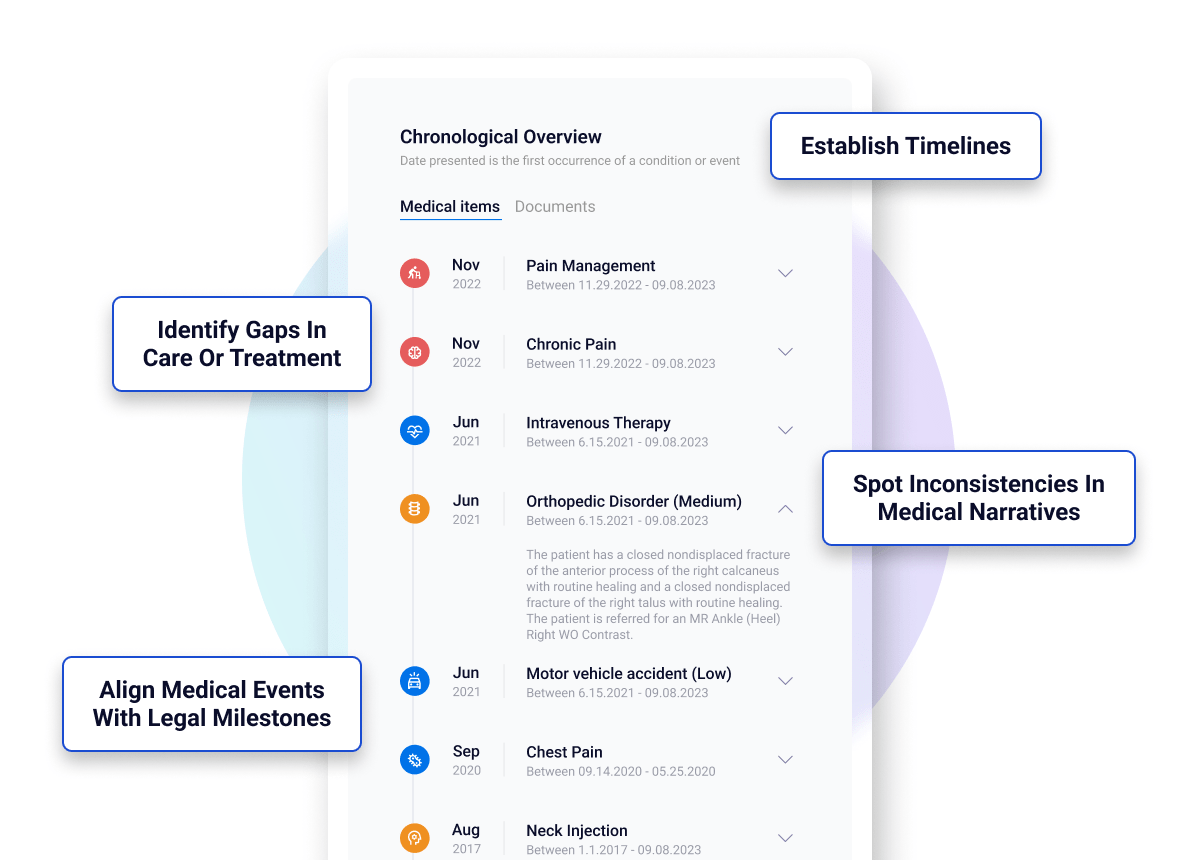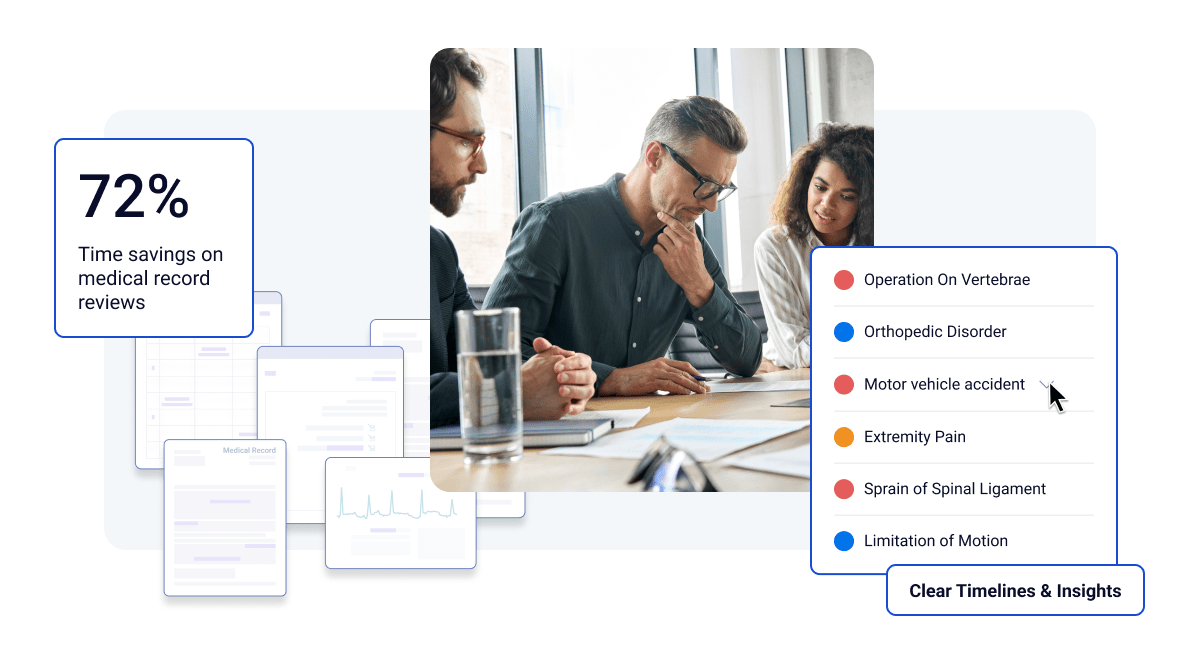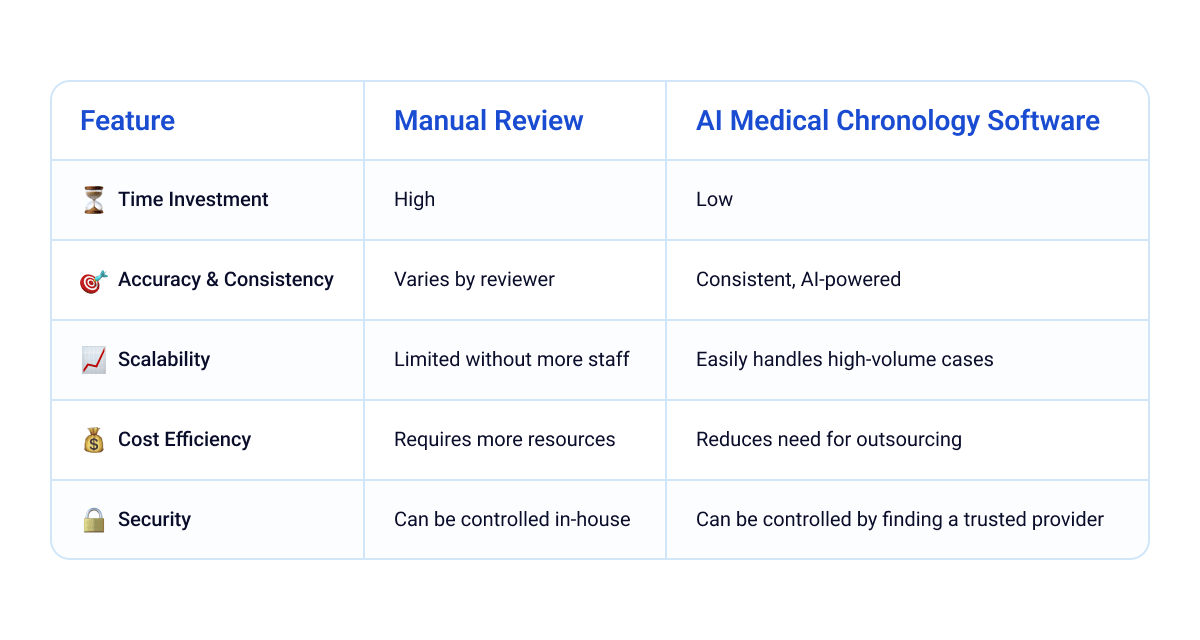

The legal landscape is evolving rapidly, and law firms handling personal injury cases are increasingly turning to AI tools to streamline case preparation. One of the most impactful advancements in legal tech is the use of medical record review software for attorneys and paralegals, particularly through the creation of AI medical chronologies.
By leveraging AI software for law firms, personal injury attorneys can save time, improve accuracy, and enhance case outcomes with well-structured, reliable medical chronologies.
Personal injury lawyers rely heavily on medical records to establish causation, damages, and liability. However, manually reviewing, organizing, and summarizing extensive medical documentation can be tedious and prone to human error.
Traditional medical record review requires significant time and expertise, making it one of the most resource-intensive tasks in personal injury litigation.
Here are some of the challenges with manually creating medical record chronologies:
Manual processes also make collaboration harder. When team members rely on handwritten notes, static PDFs, or fragmented systems, it’s easy to miss critical context. Important details can get buried, timelines can become unclear, and teams may spend more time organizing information than using it to build a strong case.
A medical chronology is a report that provides a concise, easy-to-understand summary of a claimant’s medical history. It often highlights key medical events, treatments, and diagnoses in chronological order.
These chronologies provide a quick, yet comprehensive view of a patient’s medical journey, which is especially valuable in personal injury, mass tort, and medical malpractice cases.
Chronologies are an extremely helpful tool for attorneys who need to efficiently establish timelines, identify gaps in care or treatment, spot inconsistencies in medical narratives, or align medical events with legal milestones, like accidents or reported symptoms.

When done well, a medical chronology becomes the foundation for building persuasive legal arguments, preparing demand letters, and conducting negotiations.
By implementing AI for lawyers, firms can automate the creation of medical chronologies, producing structured and accurate timelines of an individual’s medical history. AI medical chronology software extracts, organizes, and highlights crucial details such as injuries, treatments, diagnoses, and provider visits, making it easier for attorneys to build strong cases efficiently.
AI solutions also make it easier to update or revisit a case. When new records are added, the platform can reprocess the information quickly. This ensures legal teams always have the most current, consistent view of a claim.
There are numerous benefits to using medical chronology services powered by AI. These chronologies can dramatically increase efficiency and time savings. For example, users of DigitalOwl report up to 72% time savings on medical record reviews. This improves resource allocation by freeing up attorneys and paralegals to focus on higher-value tasks, such as case strategy.
Users of DigitalOwl report up to 72% time savings on medical record reviews.

AI can also dramatically improve the accuracy of medical record reviews and chronologies. Unlike people, it never gets tired or bored and excels at finding minute discrepancies within hundreds or thousands of similar-looking pages.
“I am more prepared using DigitalOwl than defense lawyers are,” said Peter Wilborn, Attorney at Wilborn Law.
As a result, attorneys who use AI medical chronologies can quickly access clear, structured timelines and insights, improving case preparation and ensuring they don’t miss a thing.
“I am more prepared using DigitalOwl than defense lawyers are,” said Peter Wilborn, Attorney at Wilborn Law.
Another benefit of using AI is scalability. Attorneys who use this software can manage higher volumes of cases without compromising quality or consistency, allowing them to do more with the same resources. This leads to greater cost efficiency and helps firms stay competitive as caseloads grow.
AI medical chronology tools use natural language processing (NLP) and machine learning to analyze large volumes of complex medical data. These AI-powered systems can:
With specialized AI, personal injury attorneys can access structured medical records, cross-reference information, and develop compelling case narratives more efficiently.
Modern tools can also provide features like clickable evidence, searchable timelines, and smart tables that break down medications, diagnoses, provider visits, and pain scores. This not only helps with case review, but also enhances collaboration across the legal team.
While manual medical record reviews offer control over the process, they’re also time-consuming and difficult to scale. Here are a few key benefits of using AI medical chronology software instead.

Finding the right AI tool for your firm depends on your unique needs. Today, there are AI-powered solutions for nearly every aspect of legal operations, from case management and document drafting to medical record reviews and legal research. Whatever your focus, it’s important to carefully evaluate your options before selecting a vendor. Here are three key considerations to keep in mind.
Hear what Peter Wilborn, Attorney at Wilborn Law has to say about using open-source AI for important legal tasks.
Watch the webinar recording here.
As AI software for lawyers evolves, its role in personal injury litigation will continue to grow. Using AI-powered medical record review software enables a more efficient, accurate, and defensible approach to case evaluation and management. Law firms that adopt AI for medical chronology creation are better positioned to handle complex cases, exceed client expectations, and achieve superior outcomes.
Law firms that adopt AI for medical chronology creation are better positioned to handle complex cases, exceed client expectations, and achieve superior outcomes.
Get high-quality medical record summaries, chronologies, and insights in 24 hours or less with DigitalOwl’s secure platform. Upload your first case free today!
